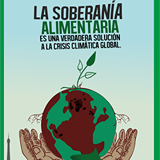
La Via Campesina
Unity among peasants, landless, women farmers and rural youth
La Via Campesina is the international movement which brings together millions of peasants, small and medium-size farmers, landless people, women farmers, indigenous people, migrants and agricultural workers from around the world. It defends small-scale sustainable agriculture as a way to promote social justice and dignity. It strongly opposes corporate driven agriculture and transnational companies that are destroying people and nature.
La Via Campesina comprises about 150 local and national organizations in 70 countries from Africa, Asia, Europe and the Americas. Altogether, it represents about 200 million farmers. It is an autonomous, pluralist and multicultural movement, independent from any political, economic or other type of affiliation.
A movement born in 1993
A group of farmers’ representatives – women and men- from the four continents founded La Via Campesina in 1993 in Mons, Belgium. At that time, agricultural policies and the agribusiness were becoming globalized and small farmers needed to develop and struggle for a common vision. Small-scale farmers’ organizations also wanted to have their voice heard and to participate directly in the decisions that were affecting their lives.
La Via Campesina is now recognised as a main actor in the food and agricultural debates. It is heard by institutions such as the FAO and the UN Human Rights Council, and is broadly recognized among other social movements from local to global level.
Golbalizing hope, globalizing the struggle!
La Via Campesina is built on a strong sense of unity and solidarity between small and medium-scale agricultural producers from the North and South. The main goal of the movement is to realize food sovereignty and stop the destructive neoliberal process. It is based on the conviction that small farmers, including peasant fisher-folk, pastoralists and indigenous people, who make up almost half the world’s people, are capable of producing food for their communities and feeding the world in a sustainable and healthy way.
Women play a crucial role in the Via Campesina work. According to the FAO, women produce 70% of the food on earth but they are marginalized and oppressed by neoliberalism and patriarchy. The movement defends women rights and gender equality at all levels. It struggles against all forms of violence against women.
Defending Food Sovereignty
Via Campesina launched the idea of “Food Sovereignty” at the World Food Summit in 1996. This idea has now grown into a global people’s movement carried by a large diversity of social sectors such as the urban poor, environmental and consumer groups, women associations, fisher-folks, pastoralists and many others. It is also recognized by several institutions and governments.
Food sovereignty is the right of peoples to healthy and culturally appropriate food produced through sustainable methods and their right to define their own food and agriculture systems. It develops a model of small scale sustainable production benefiting communities and their environment. It puts the aspirations, needs and livelihoods of those who produce, distribute and consume food at the heart of food systems and policies rather than the demands of markets and corporations.
Food sovereignty prioritizes local food production and consumption. It gives a country the right to protect its local producers from cheap imports and to control production. It ensures that the rights to use and manage lands, territories, water, seeds, livestock and biodiversity are in the hands of those who produce food and not of the corporate sector. Therefore the implementation of genuine agrarian reform is one of the top priorities of the farmer’s movement.
Food sovereignty now appears as one of the most powerful response to the current food, poverty and climate crises.
8 publications
-
CLOC/LVC, May 2024
La Via Campesina, CLOC/LVC
-
Revista Soberania alimentaria, biodiversidad y culturas n°8: Comercio y Soberania alimentaria
January 2012
La Via Campesina, GRAIN
-
La agricultura campesina sostenible puede alimentar al mundo
2010
La Via Campesina
-
Sustainable Peasant and Family Farm Agriculture Can Feed the World
2010
La Via Campesina
-
L’Agriculture familiale, paysanne et durable peut nourrir le monde
2010
La Via Campesina
-
Los pequeños agricultores y la agricultura de pequeña escala estan enfriando el planeta
2009
La Via Campesina
-
La Via Campesina position paper: Small Scale Sustainable Farmers Are Cooling Down The Earth
2009
La Via Campesina
-
Les petits agriculteurs et l’agriculture à petite échelle refroidissent la planète
2009
La Via Campesina
One video
-
Guaranting the Right to Food: Webinar on the Resolution 2577 of the Council of Europe
November 2024
FIAN belgium, La Via Campesina, Geneva Academy
2 pedagogical tools
-
United Nations Declaration on the Rights of Peasants and Other People Working in Rural Areas
Book of Illustrations
2020
La Via Campesina
-
Food Sovereignty NOW! An in-depth guide
February 2018
La Via Campesina
One case study
-
Agroecología campesina por la soberanía alimentaria y la madre tierra
Cuaderno 7
La Vía Campesina, November 2015
La Via Campesina
6 Analyses/working papers/articles
-
Revista Soberania alimentaria, biodiversidad y culturas n°8: Comercio y Soberania alimentaria
January 2012
La Via Campesina, GRAIN
-
Desafíos políticos y organizativos de los movimientos campesinos de América Latina (Parte II)
João Pedro Stedile, March 2011
La Via Campesina
-
Desafíos políticos y organizativos de los movimientos campesinos de América Latina (Parte I)
João Pedro Stedile, March 2011
La Via Campesina
-
Resumen historico de La Vía Campesina
Annette-Aurélie Desmarais, March 2011
La Via Campesina
-
Pamela Caro, August 2010
La Via Campesina
-
December 2009
La Via Campesina
